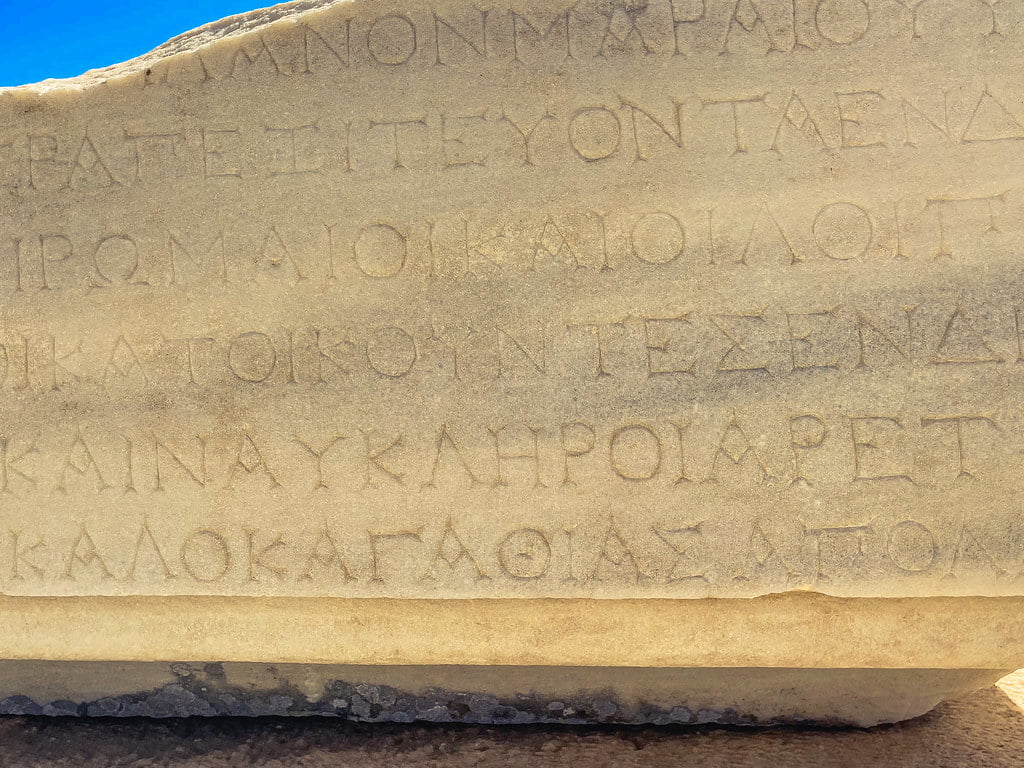Set in the heart of the Cyclades, Naxos defies the expectations of what a Greek island should be. It’s not just whitewashed houses and turquoise waters (though you’ll find those, too). It’s a place of surprising depth, where fertile valleys meet ancient ruins and where the simplest of moments can feel profound.
The Gate to the Past: Portara
As you sail into the harbor, you can’t miss the Portara, an imposing marble doorway that stands on the islet of Palatia, just off Naxos Town. It’s the skeleton of an unfinished temple to Apollo, left behind by the ancient builders as if they, too, were awestruck by the beauty of this place and simply forgot to finish their work.
Standing beneath it at sunset, with the Aegean stretching endlessly before you, it feels less like a ruin and more like a portal to something eternal. The wind hums, the waves crash, and for a moment, you understand why Naxos has inspired myths for centuries.
Chora: A Labyrinth of Life
The island’s capital, Chora, is not just a town, it’s a living organism. Its narrow, winding streets seem designed to get you lost, but that’s half the fun. Around one corner, you’ll stumble upon a sunlit square buzzing with life; around another, a quiet alley draped in bougainvillea.
The Kastro, a medieval castle built by the Venetians, crowns the town, offering views that seem to hold the whole island in their embrace. Inside its walls, time slows. There’s a museum here, yes, but also people going about their lives, as if living in a centuries-old fortress is the most normal thing in the world.
The Call of the Countryside
Leave Chora, and Naxos begins to unfold in layers. It’s an island of mountains that seem to rise defiantly from the sea, of valleys lush with olive trees and citrus groves.
In the village of Halki, you’ll find the beating heart of the island’s ancient spirit. Here, stone houses line the streets, and the air smells faintly of citron from the island’s famous Kitron distillery. Sip this local liqueur, and you’ll taste the essence of Naxos: sweet, sharp, and unforgettable.
Climb higher into the mountains, and you’ll reach Apeiranthos, a village built from marble, where the light bounces off every surface as if the very stones are alive. Its cobbled streets feel like they’ve been carved from time itself, and the views from its terraces will steal your breath away.
The Beaches: More Than Just Sand
It’s tempting to talk about Naxos’ beaches the way travel brochures do, but they deserve better. Take Agios Prokopios, for example, where the sand feels like silk underfoot, and the water is so clear you can count the pebbles beneath the surface. Or Plaka, where endless stretches of beach invite you to lose track of time entirely.
But the beaches here aren’t just for lounging. They’re where life happens, families picnicking under tamarisk trees, kite surfers chasing the wind, and fishermen mending their nets in the shade of their boats.
The Taste of Naxos
The food in Naxos is not just sustenance; it’s storytelling. Every bite carries the memory of a land that gives generously to those who tend it. The island is famous for its graviera cheese, its potatoes (somehow sweeter than any you’ve ever tasted), and its lamb, slow-cooked with wild herbs that grow freely on the hillsides.
In a quiet taverna in one of the villages, you might find yourself served a plate of rosto, pork cooked with garlic and red wine, or a simple salad bursting with local tomatoes and feta. Pair it with a glass of local wine, and you’ll understand that Naxos doesn’t just feed you; it nourishes you.
A Land of Myths
It’s impossible to separate Naxos from its legends. This is the island where Dionysus, the god of wine, once roamed, and where Theseus abandoned Ariadne after defeating the Minotaur. These stories linger in the air, woven into the landscape, as if the gods themselves might still be watching.
Naxos: An Island That Grows on You
Naxos doesn’t hit you with instant drama. It’s not a place of flashy luxury or over-the-top displays. Instead, it takes its time, revealing itself slowly, like a story that gets better with each telling.
And when you leave, as the Portara fades into the distance, you’ll feel like you’re leaving behind more than just an island. You’ll feel like you’re leaving a part of yourself. But don’t worry, Naxos has a way of calling you back.









